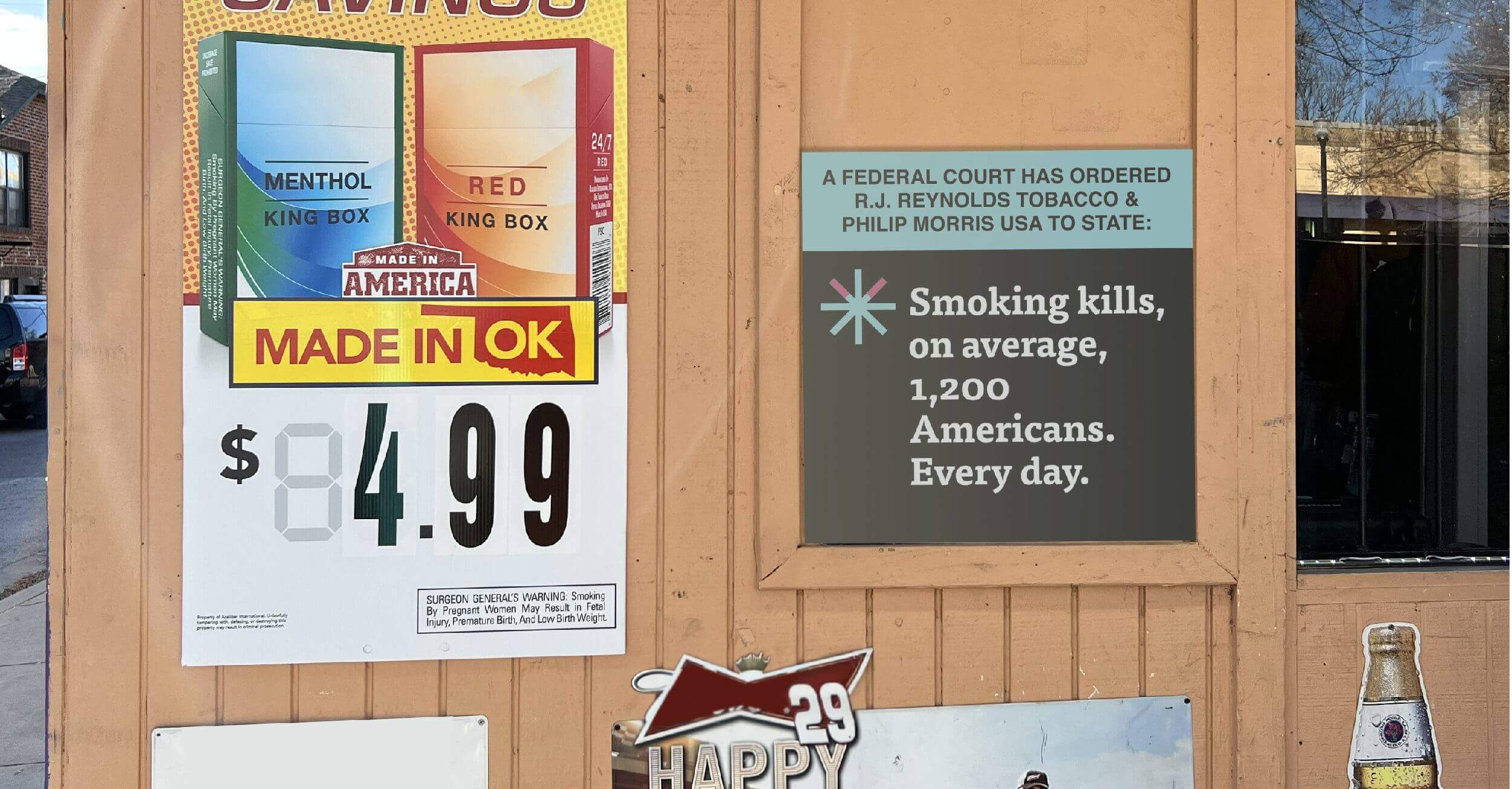In 2006, the US District Court for the District of Columbia ruled that tobacco companies were guilty of breaking civil racketeering laws, marketing to children and minority populations, and lying to the public about the dangers of smoking.
“Substantial evidence establishes that [tobacco companies] have engaged in and executed – and continue to engage in and execute – a massive 50-year scheme to defraud the public…”
– Judge Gladys Kessler, in the 2006 ruling
While Big Tobacco fought the ruling for years, the companies were forced by the ruling’s terms to take action to admit their guilt in national media, retail stores and on their own cigarette packaging.
From mid-2023 to mid-2025, nearly 200,000 tobacco retailers nationwide displayed signs with corrective statements from the tobacco industry in their stores. This is the long-awaited result of the landmark ruling with the Department of Justice.
Prior to the point-of-sale corrective statements, Big Tobacco had also been required to post similar statements on television, in print publications and online.

What Big Tobacco MUST ADMIT to the Public:
on health
- Smoking kills, on average, 1,200 Americans. Every day.
- More people die every year from smoking than from murder, AIDS, suicide, drugs, car crashes and alcohol, combined.
- Smoking causes heart disease, emphysema, acute myeloid leukemia, and cancer of the mouth, esophagus, larynx, lung, stomach, kidney, bladder and pancreas.
- Smoking also causes reduced fertility, low birth weight in newborns and cancer of the cervix.
on addiction
- Smoking is highly addictive. Nicotine is the addictive drug in tobacco.
- Cigarette companies intentionally designed cigarettes with enough nicotine to create and sustain addiction.
- It’s not easy to quit.
- When you smoke, the nicotine actually changes the brain — that’s why quitting is so hard.
On “light” and “low tar” products
- Many smokers switch to low tar and light cigarettes rather than quitting because they think low tar and light cigarettes are less harmful. They are not.
- “Low tar” and “light” cigarette smokers inhale essentially the same amount of tar and nicotine as they would from regular cigarettes.
- All cigarettes cause cancer, lung disease, heart attacks and premature death – lights, low tar, ultra lights and naturals. There is no safe cigarette.
on product manipulation
- Altria, R.J. Reynolds Tobacco, Lorillard, and Philip Morris USA intentionally designed cigarettes to make them more addictive.
- Cigarette companies control the impact and delivery of nicotine in many ways, including designing filters and selecting cigarette paper to maximize the ingestion of nicotine, adding ammonia to make the cigarette taste less harsh and controlling the physical and chemical make-up of the tobacco-blend.
- When you smoke, the nicotine actually changes the brain. That’s why quitting is so hard.
on secondhand smoke
- Secondhand smoke kills over 38,000 Americans each year.
- Secondhand smoke causes lung cancer and coronary heart disease in adults who do not smoke.
- Children exposed to secondhand smoke are at an increased risk for sudden infant death syndrome (SIDS), acute respiratory infections, ear problems, severe asthma and reduced lung function.
- There is no safe level of exposure to secondhand smoke.
The ruling definitively exposes the tobacco industry’s deceptive marketing tactics and callous disregard of its products’ dangers.
For decades, Big Tobacco heavily marketed to Black Americans, particularly for menthol cigarettes and cancer-causing little cigars and cigarillos. Though menthol cigarettes are even more hazardous than other cigarettes, tobacco companies have continued to market these deadly products to the Black American community. Learn more about how Big Tobacco is targeting minority groups here.
View excerpts and findings from the ruling in The Verdict Is In, produced by the Tobacco Control Legal Consortium. The full ruling is available here.
Learn how you can fight back against Big Tobacco’s deception by protecting your family and getting involved.
